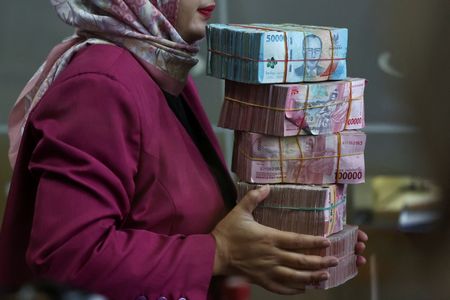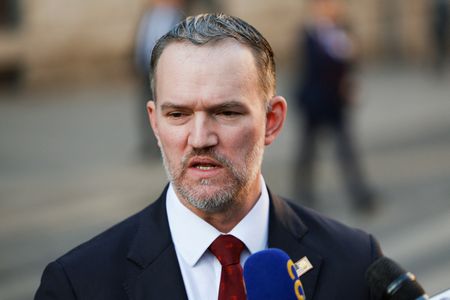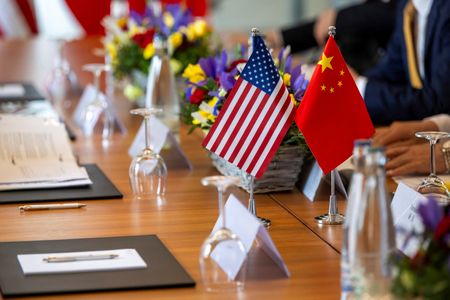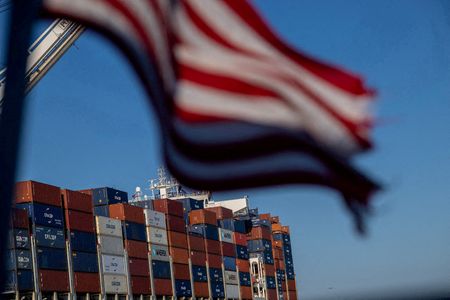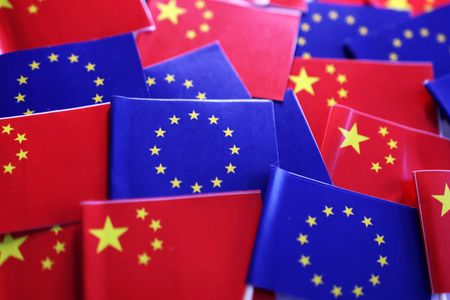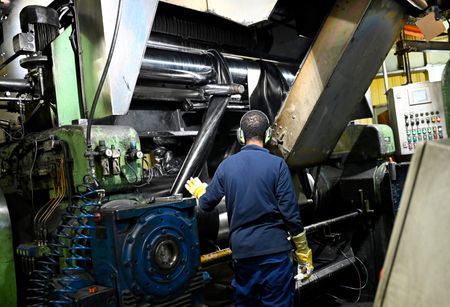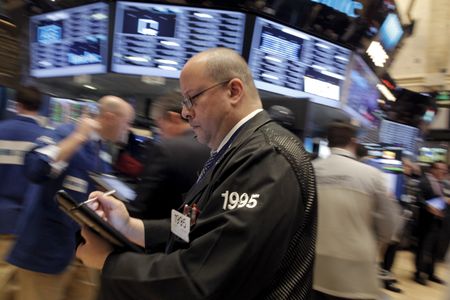By Gayatri Suroyo and Stefanno Sulaiman
JAKARTA (Reuters) -Indonesia’s central bank paused its aggressive rate-cutting campaign this week, to focus instead on getting banks to lower loan costs. However, companies say banks aren’t the problem – it’s government policy.
Businesses are shying away from investing despite government efforts to stimulate Southeast Asia’s largest economy, citing policy uncertainties one year into President Prabowo Subianto’s term. Consumers are also cautious about spending due to job insecurity.
Bank Indonesia (BI) unexpectedly maintained its policy rate at 4.75% on Wednesday, confounding market expectations for a fourth straight cut. It says it will prioritise improving policy transmission, underscoring a tepid response to stimulus measures and slow credit uptake in the $1.4 trillion economy.
While BI has lowered its benchmark rate by 150 basis points since September last year, lending rates have only decreased by 15 basis points, a disparity Governor Perry Warjiyo attributed to depositors demanding higher savings returns.
Warjiyo acknowledged that credit demand had been dampened by businesses’ cautious stance and reliance on internal funding.
Shinta Kamdani, chairwoman of the Indonesia Employers Association, said the investment climate is the key factor deterring businesses, rather than borrowing costs and banks’ strict lending requirements.
“Sluggish economic growth is largely caused by uncertainty and unpredictability in the investment climate, both domestically and internationally, forcing businesses and investors to adopt a wait-and-see approach or refrain from expanding their operations,” said Kamdani, who is also chief executive of conglomerate Sintesa Group.
RANGE OF CONCERNS
Interviews conducted by Reuters with a dozen business leaders across sectors such as retail, mining, agriculture and property showed concerns over Prabowo’s policies, including increased state control in industries and reduced communication with the business community as well as ineffective programmes.
Many of the business people declined to be named fearing repercussions for speaking publicly.
“Many mining businesses are afraid of investing further, which can be seen by a lack of mineral exploration in Indonesia, due to investment uncertainties,” a mining executive said.
Prabowo, who promised to continue the business-friendly policies of his predecessor Joko Widodo, marked his first year in office on October 20. Since he came to power, his government has taken a stricter stance on industries such as palm oil and tin, sparking fears of asset seizures and shorter-duration mining quotas.
PUBLIC SPENDING FOR GROWTH
Prabowo aims to boost economic growth to 8% from around 5% through programmes such as free school meals and food security. However, these initiatives have led to fiscal cuts for provincial governments.
An automotive executive said cuts could lead authorities to make up lost revenue from other areas, such as increased auto tax, which, in turn, would hit car sales.
“We expect a shift from traditional fiscal orthodoxy, implying a bigger role for public spending in supporting growth and expecting to crowd in private sector players,” DBS economist Radhika Rao said.
“Domestic firms are likely to seek demand visibility before making fresh capex commitments,” she said.
Loan growth, which hit a three-year low in July, remains subdued at 7.7% in September, below BI’s target range of 8-11% in 2025.
AWAITING STIMULUS RESPONSE
The government has launched several stimulus measures, including a $2.8 billion package for the fourth quarter and $12 billion transferred from the central bank to state banks, aimed at boosting purchasing power following deadly protests in August over lawmakers’ enhanced benefits and widespread job losses.
Still, banks have 2,374.8 trillion rupiah ($143.3 billion) in undisbursed loans as of September, more than a fifth of their approved pipeline, according to BI.
Starting December 1, BI plans to incentivise banks to lower lending rates by reducing reserve requirements.
Mira Arifin, Indonesia country executive at Bank of America, said banks were competing to collect funds by giving higher rates prior to BI’s easing cycle and that likely caused their funding costs to be locked in for a longer term.
Businesses, meanwhile, are waiting for clearer signs of economic recovery, including lower bank rates, before taking on loans, said Victor Matindas, head of research at Bank Central Asia, Indonesia’s largest private lender.
“NEVER MIND EXPANSION”
Consumer confidence fell to its lowest since 2022 last month. But while not all economic data has been negative, a retail firm executive said doubts over the numbers have made it difficult to make investment decisions.
On the ground, businesses are feeling the pinch.
Adhikara Joshua, 32, owner of a coffee shop Kopi Kila on the outskirts of Jakarta, has shelved plans to open a second branch, citing a 20% drop in sales this year and rising coffee bean prices. “Never mind expansion for now,” he said.
Similarly, Edwina Ananda, 31, who runs online clothing shop Smitten by Pattern, cited a one-third drop in sales amid weak purchasing power and a shift in consumer preferences toward offline shopping.
While considering opening a physical store with a bank loan, Ananda remains cautious. “Our current focus is to pay up our existing loan because paying interest is quite a significant expense amid this market uncertainty.”
($1 = 16,570.0000 rupiah)
(Reporting by Jakarta bureau; Editing by Gibran Peshimam and Jacqueline Wong)

